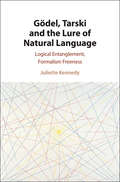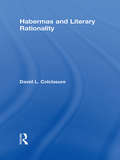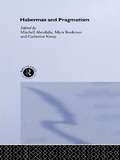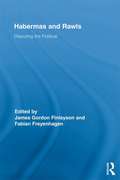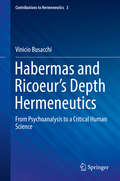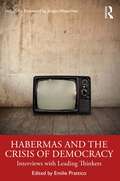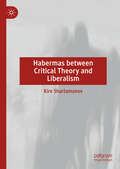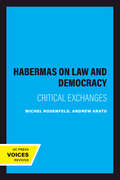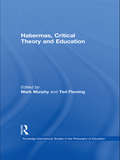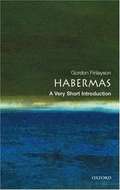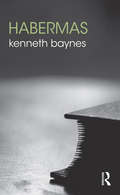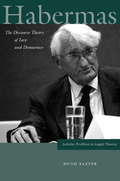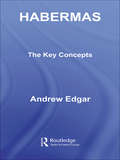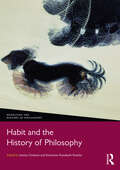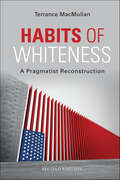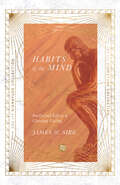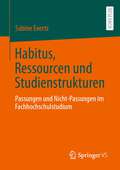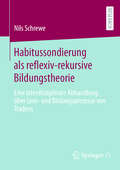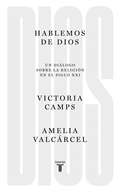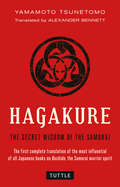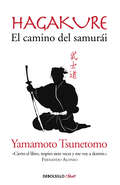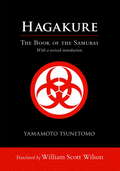- Table View
- List View
Gödel, Tarski and the Lure of Natural Language: Logical Entanglement, Formalism Freeness
by Juliette KennedyIs mathematics 'entangled' with its various formalisations? Or are the central concepts of mathematics largely insensitive to formalisation, or 'formalism free'? What is the semantic point of view and how is it implemented in foundational practice? Does a given semantic framework always have an implicit syntax? Inspired by what she calls the 'natural language moves' of Gödel and Tarski, Juliette Kennedy considers what roles the concepts of 'entanglement' and 'formalism freeness' play in a range of logical settings, from computability and set theory to model theory and second order logic, to logicality, developing an entirely original philosophy of mathematics along the way. The treatment is historically, logically and set-theoretically rich, and topics such as naturalism and foundations receive their due, but now with a new twist.
Habermas
by Stephen K. WhiteThis volume examines the historical and intellectual contexts out of which Habermas' work emerged, and offers an overview of his main ideas, including those in his most recent publication. Among the topics discussed are: his relationship to Marx and the Frankfurt School of critical theory, his unique contributions to the philosophy of social sciences, the concept of "communicative ethics," and the critique of postmodernism. Particular attention is paid to Habermas' recent work on democratic theory and the constitutional state.
Habermas and Literary Rationality (Routledge Studies In Contemporary Philosophy Ser. #20)
by David L. ColclasureLiterary scholarship has paid little serious attention to Habermas' philosophy, and, on the other hand, the reception of Habermas has given little attention to the role that literary practice can play in a broader theory of communicative action. David Colclasure's argument sets out to demonstrate that a specific, literary form of rationality inheres in literary practice and the public reception of literary works which provides a unique contribution to the political public sphere.
Habermas and Pragmatism
by Mitchell Aboulafia Myra Bookman Catherine KempThere are few living thinkers who have enjoyed the eminence and reown of Jürgen Hamermas. His work has been highly influential not only in philosopy, but also in the fields of politics, sociology and law. This is the first collection dedicated to exploring the connections between his body of work ahd America's most significant philosophical movement, pragmatism. Habermas and Pragmatism considers the influence of pragmatism on Habermas's thought and the tensions between Habermasian social theory and pragmatism. Essays by distinguished pragmatists, legal and critical theorists, and Habermas cover a range of subjects including the philosophy of language, the nature of rationality, democracy, objectivity, transcendentalism, aesthetics, and law. The collection also addresses the relationship to Habermas of Kant, Peirce, Mead, Dewey, Piaget, Apel, Brandom and Rorty.
Habermas and Rawls: Disputing the Political (Routledge Studies in Contemporary Philosophy #23)
by James Gordon Finlayson Fabian FreyenhagenHabermas and Rawls are two heavyweights of social and political philosophy, and they are undoubtedly the two most written about (and widely read) authors in this field. However, there has not been much informed and interesting work on the points of intersection between their projects, partly because their work comes from different traditions—roughly the European tradition of social and political theory and the Anglo-American analytic tradition of political philosophy. In this volume, contributors re-examine the Habermas-Rawls dispute with an eye toward the ways in which the dispute can cast light on current controversies about political philosophy more broadly. Moreover, the volume will cover a number of other salient issues on which Habermas and Rawls have interesting and divergent views, such as the political role of religion and international justice.
Habermas and Ricoeur's Depth Hermeneutics
by Vinicio BusacchiThis book presents a critical and systematic study of the possibility to consider and practice Freud's psychoanalysis as a form of depth hermeneutics. It contributes to a screening of the possibility of a hermeneutical interpretation of psychoanalysis, particularly with respect to the therapeutic practice. The book is an investigation into the philosophical implications of the hermeneutical re-reading of psychoanalysis and clarifies the real speculative and theoretical potential behind the dialectic of hermeneutics and psychoanalysis. It examines two themes which, so far, have remained unclarified and unexplored in their potentiality: firstly, at the level of a construction of a procedural model for the human and social sciences, as well as for philosophy, and, secondly, at the level of a philosophy of the human being able to subsume and express the biological and natural dimension of human identity as well as its historical narrative and social identity.
Habermas and Theology
by Nicholas AdamsHow can the world's religious traditions debate within the public sphereï 1/2 In this book Nicholas Adams shows the importance of Habermas' approaches to this question. The full range of Habermas' work is considered, with detailed commentary on the more difficult texts. Adams energetically rebuts some of Habermas' arguments, particularly those which postulate the irrationality or stability of religious thought. Members of different religious traditions need to understand their own ethical positions as part of a process of development involving ongoing disagreements, rather than a stable unchanging morality. Public debate additionally requires learning each other's patterns of disagreement. Adams argues that rather than suspending their deep reasoning to facilitate debate, as Habermas suggests, religious traditions must make their reasoning public, and that 'scriptural reasoning' is a possible model for this. Habermas overestimates the stability of religious traditions. This book offers a more realistic assessment of the difficulties and opportunities they face.
Habermas and the Crisis of Democracy: Interviews with Leading Thinkers
by Emilie Prattico"Emilie Prattico has used the lens of a discourse-theoretic conception of deliberative democracy to engage eight prominent colleagues in stimulating interviews. They critically illuminate the various ways that a sound democratic regime depends upon the deliberative milieu of an inclusive public sphere." - Jürgen Habermas The continued rise of populism and authoritarianism throughout the world has witnessed an alarming attack on basic democratic freedoms and led to a divided political and social world. Few thinkers have done as much as Jürgen Habermas to understand and critique these problems, perhaps most famously through his notions of the public sphere, deliberative democracy, and discourse ethics. In this fascinating book, Emilie Prattico considers the crisis of democracy from a Habermasian standpoint via engaging interviews with an outstanding lineup of leading philosophers and thinkers. The following key topics are unpacked and explored: Can some basic rights and liberties be given up to safeguard democracy? With Hauke Brunkhorst How does actual deliberation confer legitimacy to democratic decisions? With Cristina Lafont Why is "fake news" a crisis of democracy? With Michael Lynch How can we build a public sphere together and share it in a world characterized by divisiveness and tribalism? With Barbara Fultner Can democracy survive without the voice of experts? With Kenneth Baynes How dangerous are the current forms of authoritarianism we are seeing take hold all over the world? With María Pía Lara What does the public sphere look like with new technologies? With Gertrud Koch What duties do we owe descendants of slaves and how do we reckon with our antidemocratic and oppressive past? With Lorenzo Simpson Also including a Foreword by Habermas himself, this book is essential reading for anyone seeking to understand the challenges facing democracy and liberalism today. It will be of great interest to those in philosophy, sociology, and politics as well as related fields such as religion and law.
Habermas between Critical Theory and Liberalism
by Kire SharlamanovThis book identifies the turning points in Habermas's work and his transition from one stage to another in the development of his theoretical oeuvre. Habermas began his academic career as part of the Frankfurt School, but the two key points at which his career changes trajectory are moving from historical materialism to normative idealism and playing with some of the ideas of liberalism. Normative idealism is an ahistorical theory that insists on the independence of the normative from material reality, severing the connection between base and superstructure that Marx wrote about. The break with the basic concepts of Marxism enabled Habermas to build his own discursive (critical) theory, which, especially since the end of the 1980s, takes the ideas of liberalism seriously. This book makes a systematic, multidimensional and detailed analysis of Habermas's theoretical oeuvre in two dimensions, chronological (in the order in which Habermas worked on certain topics) and thematic (enclosingcertain thematic units).
Habermas on Law and Democracy: Critical Exchanges (Philosophy, Social Theory, and the Rule of Law #6)
by Michel Rosenfeld Andrew AratoIn the first essay, Habermas himself succinctly presents the centerpiece of his theory: his proceduralist paradigm of law. The following essays comprise elaborations, criticisms, and further explorations by others of the most salient issues addressed in his theory. The distinguished group of contributors—internationally prominent scholars in the fields of law, philosophy, and social theory—includes many who have been closely identified with Habermas as well as some of his best-known critics. The final essay is a thorough and lengthy reply by Habermas, which not only engages the most important arguments raised in the preceding essays but also further elaborates and refines some of his own key contributions in Between Facts and Norms. This volume will be essential reading for philosophers, legal scholars, and political and social theorists concerned with understanding the work of one of the leading philosophers of our age.These provocative, in-depth debates between Jürgen Habermas and a wide range of his critics relate to the philosopher's contribution to legal and democratic theory in his recently published Between Facts and Norms. Drawing upon his discourse theory, Habermas has elaborated a novel and powerful account of law that purports to bridge the gap between democracy and rights, by conceiving law to be at once self-imposed and binding.
Habermas, Critical Theory and Education (Routledge International Studies in the Philosophy of Education)
by Mark Murphy Ted FlemingThe sociologist and philosopher Jürgen Habermas has had a wide-ranging and significant impact on understandings of social change and social conflict. However, there has been no concerted and focused attempt to introduce his ideas to the field of education broadly. This book rectifies this omission and delivers a definitive contribution to the understanding of Habermas's oeuvre as it applies to the field. The authors examine the contribution Habermas's theory has and can make to: pedagogy, learning and classroom interaction; the relation between education, civil society and the state; forms of democracy, reason and critical thinking; and performativity, audit cultures and accountability. Additionally, the book answers a range of more specific questions, including: what are the implications for pedagogy of a shift from a philosophy of consciousness to a philosophy of language?; What contribution can Habermas's re-shaping of speech act theory and communicative rationality make to theories of classroom interaction?; and how can his theories of reason and colonization be used to explore questions of governance and accountability in education?
Habermas: A Very Short Introduction
by James Gordon FinlaysonThis book gives a clear and readable overview of the philosophical work of Jurgen Habermas, the most influential German philosopher alive today, who has commented widely on subjects such as Marxism, the importance and effectiveness of communication, the reunification of Germany, and the European Union. Gordon Finlayson provides readers with a clear and readable overview of Habermas's forbiddingly complex philosophy using concrete examples and accessible language. He then goes on to analyze both the theoretical underpinnings of Habermas's social theory, and its more concrete applications in the fields of ethics, politics, and law; and concludes with an examination how Habermas's social and political theory informs his writing on contemporary, political, and social problems.
Habermas: Essays On Habermas's Between Facts And Norms (The Routledge Philosophers)
by Kenneth BaynesJürgen Habermas is one of the most important German philosophers and social theorists of the late twentieth and early twenty-first century. His work has been compared in scope with Max Weber’s, and in philosophical breadth to that of Kant and Hegel. In this much-needed introduction Kenneth Baynes engages with the full range of Habermas’s philosophical work, addressing his early arguments concerning the emergence of the public sphere and his initial attempt to reconstruct a critical theory of society in Knowledge and Human Interests. He then examines one of Habermas’s most influential works, The Theory of Communicative Action, including his controversial account of the rational interpretation of social action. Also covered is Habermas’s work on discourse ethics, political and legal theory, including his views on the relation between democracy and constitutionalism, and his arguments concerning human rights and cosmopolitanism. The final chapter assesses Habermas’s role as a polemical and prominent public intellectual and his criticism of postmodernism in The Philosophical Discourse of Modernity, in addition to his more recent writings on the relationship between religion and democracy. Habermas is an invaluable guide to this key figure in contemporary philosophy, and suitable for anyone coming to his work for the first time.
Habermas: The Discourse Theory of Law and Democracy
by Hugh BaxterThough many legal theorists are familiar with Jürgen Habermas's work addressing core legal concerns, they are not necessarily familiar with his earlier writings in philosophy and social theory. Because Habermas's later work on law invokes, without significant explanation, the whole battery of concepts developed in earlier phases of his career, even otherwise sympathetically inclined legal theorists face significant obstacles in evaluating his insights. A similar difficulty faces those outside the legal academy who are familiar with Habermas's earlier work. While they readily comprehend Habermas's basic social-theoretical concepts, without special legal training they have difficulty reliably assessing his recent engagement with contemporary legal thought. This new work bridges the gap between legal experts and those without special legal training, critically assessing the attempt of an unquestionably preeminent philosopher and social theorist to engage the world of law.
Habermas: The Key Concepts (Routledge Key Guides)
by Andrew EdgarAn independently minded champion of ‘the project of modernity’ in a supposedly post-modern age, Jurgen Habermas (1929- ) is one of the most widely influential thinkers of our times. An easy-to-use A-Z guide to a body of work that spans philosophy, sociology, politics, law and cultural theory, Habermas: The Key Concepts explores Habermas’ writings on: capitalism genetics law neo-conservatism universal pragmatics. Fully cross-referenced with extensive suggestions for further reading, this is an essential reference guide to one of the most important social theorists of the last century.
Habit and the History of Philosophy (Rewriting the History of Philosophy)
by Komarine Romdenh-Romluc Jeremy DunhamFor Aristotle, habit was a fundamental aspect of human nature; and for William James, it was the "enormous flywheel" of society. In both the history of philosophy and contemporary research, it is acknowledged as a fundamental topic in ethics, moral psychology, philosophy of action, and phenomenology. This major volume, written by a team of international contributors, is an outstanding collection that offers a thorough and diverse philosophical exploration of habit from the classical period to the modern day. Carefully edited to reflect the breadth of the subject, its 18 chapters are divided into four clear parts: Habit and Ancient Philosophy Habit and Early Modern Philosophy Habit and Modern Philosophy Contemporary Perspectives on Habit. Key topics, debates, and figures are covered such as the emotions, perception, free will, William James, John Dewey, Maurice Merleau-Ponty, John McDowell, and Hubert Dreyfus. Habit and the History of Philosophy is essential reading for students and researchers in the history of philosophy, ethics, phenomenology, philosophy of action, and pragmatism. It will also be extremely useful for those in related disciplines such as religion, sociology, and history.
Habits of Whiteness: A Pragmatist Reconstruction (American Philosophy)
by Terrance MacMullanHabits of Whiteness: A Pragmatist Reconstruction, second edition, offers a revised and updated look at the concept of whiteness in the United States. Lauded when it was first published and even more relevant today, Habits of Whiteness offers a distinctive way to talk about race and racism by focusing on racial habits and how to change them.Author Terrance MacMullan examines how the concept of racial whiteness has undermined attempts to create a truly democratic society in the United States. By getting to the core of the racism that lives on in unrecognized habits, MacMullan argues that it is possible for white people to recognize the distance between their color-blind ideals and their actual behavior. Revitalizing the work of W. E. B. Du Bois and John Dewey, MacMullan demonstrates how it is possible to reconstruct racial habits and close fissures between people. This second edition of Habits of Whiteness also contains a new introduction, which looks closely at race relations during the Obama and Trump presidencies, including such recent challenges as police brutality in 2020, white supremacy, and the Capitol insurrection. Its persuasive analysis of the impulses of whiteness ultimately reorganizes them into something more compatible with our country's increasingly multicultural heritage.
Habits of the Mind: Intellectual Life as a Christian Calling (The IVP Signature Collection)
by James W. SireChristianHabits of the Mind
Habitus, Ressourcen und Studienstrukturen: Passungen und Nicht-Passungen im Fachhochschulstudium
by Sabine EvertzWie erleben Studierende ihr Studium und wie hängt dieses Erleben mit ihren Habitusmustern und Ressourcenausstattungen zusammen? Die soziologische Studie widmet sich aus ungleichheitstheoretischer Perspektive den Passungen und Nicht-Passungen im Fachhochschulstudium. Ergründet wurden Konstellationen von Habitusmustern, Ressourcenausstattungen und Studienstrukturen. Bei den Studienstrukturen handelt es sich unter anderem um studienorganisatorische Strukturen wie die Stundenplangestaltung, um unmittelbar auf die Lehre bezogene Strukturen wie Lehrmethoden und Prüfungsformen oder auch um Strukturen, die im Besonderen das soziale Miteinander betreffen wie die Studienatmosphäre. Die Ergebnisse basieren auf der Analyse von Leitfadeninterviews mit Studierenden der Studienfächer Soziale Arbeit und Maschinenbau sowie auf der Auswertung von Wochenbüchern, die Erstsemesterstudierende in der Studieneingangsphase verfasst haben.
Habitussondierung als reflexiv-rekursive Bildungstheorie: Eine interdisziplinäre Abhandlung über Lern- und Bildungsprozesse von Tradern
by Nils SchreweDie Frage, auf welche Art und Weise sich an der Börse Geld verdienen lässt, gilt bisweilen vor allem als ein viel diskutiertes Thema innerhalb der ökonomischen Disziplin. Dies führt allerdings bisweilen dazu, dass viele Aspekte menschlicher Handlungsvollzüge entlang der Subjektfigur des Homo Oeconomicus ausgeblendet werden. Innerhalb dieser Studie wird daher in Folge einer wissenschaftstheoretischen Erörterung finanz- und erziehungswissenschaftlicher Paradigmata dafür plädiert, das Thema Finanzspekulation aus einer bildungsbiografischen Perspektive zu beleuchten. Auf der Grundlage von 10 biografischen Interviews mit eigenverantwortlich handelnden Tradern liegt somit erstens erstmals eine wissenssoziologische Studie zu der Frage, welchen habituellen Lern- und Bildungsprozessen Menschen beim Trading unterliegen, vor. Zweitens wird innerhalb derselben ein phasenhafter Verlauf biographischer Bildungsprozesse im Kontext eines Engagements an der Börse erstellt und drittens anhand eines Wechselverhältnisses von Theorie und Empirie eine reflexiv-rekursive Bildungstheorie der Habitussondierung entworfen.
Hablemos de Dios: Un diálogo sobre la religión en el siglo XXI
by Victoria CampsDos pensadoras clave exploran el lugar de las religiones de nuestro mundo, la tendencia al fundamentalismo y la posibilidad de una moral universal. ¿Una moral sin religión es una moral desprovista de fundamento? ¿Es posible pretender una moral universal que pueda ser compartida por creyentes y no creyentes? ¿Qué cabe esperar de las religiones, para bien y para mal? ¿Satisfacen las creencias religiosas alguna necesidad que no puede ser satisfecha de otra forma? ¿Se pueden acercar las posiciones de los creyentes y los no creyentes que deben convivir en una misma sociedad? Éstas y otras muchas preguntas se plantean Victoria Camps y Amelia Valcárcel en este ameno diálogo epistolar sobre la situación de la religión en el giro del nuevo siglo. Desde el deseo de reflexionar sobre la actual situación de lo religioso y con la base de la filosofía occidental, ambas exploran el lugar de las religiones en nuestro mundo, el poder de losmonoteísmos y su tendencia a desviarse hacia el fundamentalismo, la secularización y la posibilidad de una moral universal. En un momento en que en España muchos reclaman, más que nunca, la salida definitiva de la religión de la vida pública, esta defensa desapasionada pero demoledora de la laicidad está más vigente que nunca. Reseña:«El libro, escrito con mucha chispa y poderosa argumentación" cautiva. Difícil sustraerse a sus tesis.»Reyes Mate, El País
Hagakure
by Tsunetoma Yamamoto Alexander BennettThe Hagakure is one of the most influential of all Japanese texts-written nearly 300 years ago by Tsunetomo Yamamoto to summarize the very essence of the Japanese Samurai bushido ("warrior") spirit. Its influence has been felt throughout the world and yet its existence is scarcely known to many Westerners. This is the first translation to include the complete first two books of the Hagakure and the most reliable and authentic passages contained within the third book; all other English translations published previously have been extremely fragmentary and incomplete.Alex Bennett's completely new and highly readable translation of this essential work includes extensive footnotes that serve to fill in many cultural and historical gaps in the previous translations. This unique combination of readability and scholarship gives Bennett's translation a distinct advantage over all previous English editions.
Hagakure
by Yamamoto TsunetomoThe Hagakure is one of the most influential of all Japanese texts#151;written nearly 300 years ago by Tsunetomo Yamamoto to summarize the very essence of the Japanese Samurai bushido ("warrior") spirit. Its influence has been felt throughout the world and yet its existence is scarcely known to many Westerners. This is the first translation to include the complete first two books of the Hagakure and the most reliable and authentic passages contained within the third book; all other English translations published previously have been extremely fragmentary and incomplete. Alex Bennett's completely new and highly readable translation of this essential work includes extensive footnotes that serve to fill in many cultural and historical gaps in the previous translations. This unique combination of readability and scholarship gives Bennett's translation a distinct advantage over all previous English editions.
Hagakure. El camino del samurái
by Yamamoto TsunetomoUn clásico de la cultura japonesa que ayuda a la introspección y la concentración en nuestro mundo cada vez más frenético. Considerado como una de las fuentes de inspiración de Fernando Alonso, el piloto lo cita frecuentemente en sus intervenciones públicas y redes sociales. «Cuando las cosas se hacen despacio,salen mal siete veces de cada diez.El guerrero hace las cosas deprisa.» Hagakure significa «a la sombra de las hojas» y es una obra literaria japonesa escrita por Yamamoto Tsunetomo en el siglo XVIII. Su intención era transmitir a las generaciones venideras las reglas del bushido, es decir, el código guerrero de los samuráis. Se trata de un breviario, un compendio de anécdotas y reflexiones de temática variada y sin un orden preestablecido, hecho con la intención de transmitir introspección y conocimiento filosófico al tiempo que promueve el espíritu del bushido. El texto solo iba dirigido a los guerreros y se mantuvo en secreto durante muchos años. Posteriormente llegó a convertirse en un clásico de la cultura japonesa. Con una esencia que se contrapone al materialismo imperante en nuestra sociedad, este texto ha alcanzado gran notoriedad en nuestros días y ha llegado a convertirse en libro de cabecera de personajes tan admirados como Fernando Alonso, que ha llegado a tatuarse un samurái en su espalda. «¿Yo, en una palabra?», respondía recientemente en una entrevista: «Guerrero. [El samurái] es una manera de recordarme quién soy, de dónde vengo y la fuerza que tengo que tener cada día.» Fernando Alonso ha dicho...«Cierro el libro, respiro 7 veces y me voy a dormir.»
Hagakure: The Book of the Samurai
by Yamamoto Tsunetomo William Scott WilsonLiving and dying with bravery and honor is at the heart of Hagakure, a series of texts written by an eighteenth-century samurai, Yamamoto Tsunetomo. It is a window into the samurai mind, illuminating the concept of bushido (the Way of the Warrior), which dictated how samurai were expected to behave, conduct themselves, live, and die. While Hagakure was for many years a secret text known only to the warrior vassals of the Nabeshima clan to which the author belonged, it later came to be recognized as a classic exposition of samurai thought. The original Hagakure consists of over 1,300 short texts that Tsunetomo dictated to a younger samurai over a seven-year period. William Scott Wilson has selected and translated here three hundred of the most representative of those texts to create an accessible distillation of this guide for samurai. No other translator has so thoroughly and eruditely rendered this text into English. For this edition, Wilson has added a new introduction that casts Hagakure in a different light than ever before. Tsunetomo refers to bushido as "the Way of death," a description that has held a morbid fascination for readers over the years. But in Tsunetomo's time, bushido was a nuanced concept that related heavily to the Zen concept of muga, the "death" of the ego. Wilson's revised introduction gives the historical and philosophical background for that more metaphorical reading of Hagakure, and through this lens, the classic takes on a fresh and nuanced appeal.
